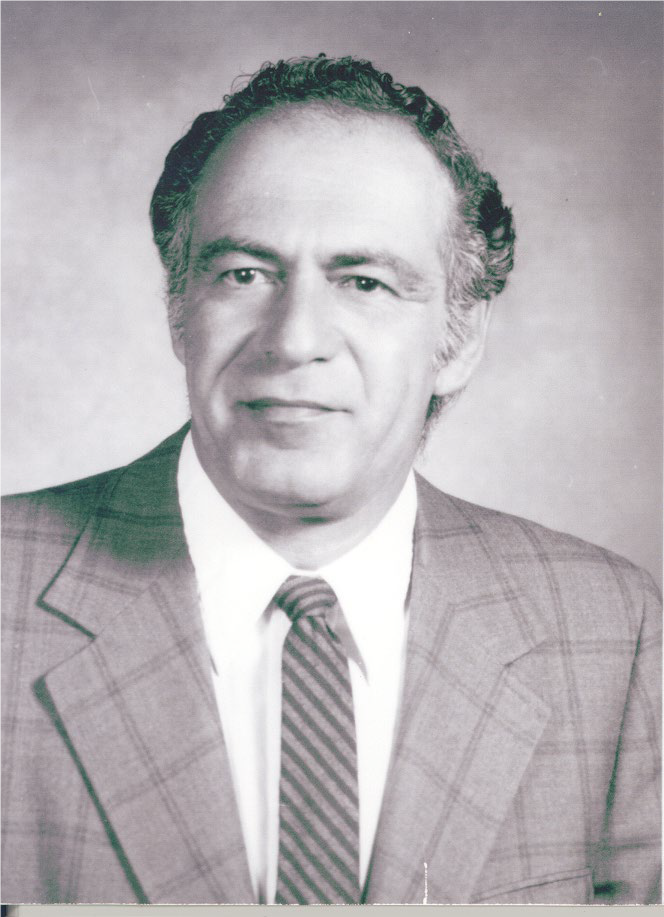
Albert Jack Silverman, M.D., C.M., (1925-2002) was a psychiatrist and neuroscience researcher who served as chair of two university psychiatry departments, including the University of Michigan Medical School’s department of psychiatry. Dr. Silverman’s career focused on bridging the divide between neuroscience-based psychiatry and traditional psychoanalysis. He retired as professor emeritus in 1990 and continued teaching and conducting rounds until 1977.
Born in Montreal, Dr. Silverman earned his bachelor’s of science and medical degrees from McGill University in Canada. He completed his residency in psychiatry at the University of Colorado Medical Center and then became a faculty member at Duke University. After becoming a naturalized American citizen in 1955, Dr. Silverman entered the Air Force. During his time at the Wright-Patterson Air Force Base, he completed his board examinations in neurology and psychiatry and led research on space neuroscience and psychology. In 1963, Dr. Silverman worked to establish a new medical school at Rutgers University, where he became the chair of their first department of psychiatry.
The 2020 Albert J. Silverman Research Conference is made possible by Mrs. Halina Silverman’s generous endowment gift. The conference honors Dr. Silverman’s work as an accomplished leader, doctor, and researcher.
This year’s virtual conference featured lightning talks in three sessions that covered research in
-
neurobehavioral research
-
somatic interventions and neurobiology, and
-
behavioral interventions.
Here is a summary of the neurobehavioral studies session, which was hosted by Liz Duval, Ph.D.:
First was Kayla Smith, B.S., who presented her work on Spatial Navigation and Symptom Severity in PTSD and how hyperarousal symptoms may be advantageous in spatial memory. She was followed by Carly Lasagna, B.A., who is studying the effect of continued theta bursts on the macular visual field. Lasagna found that there was no macular vision impairment following cTBS to V2. Meghan Martz, Ph.D., is studying substance abuse cognitions using data from the ABCD study in order to determine factors that put children at risk for later experimentation and use of substances.
Tobin J. Ehrlich, Ph.D., presented his work on determining predictors of cognitive changes in bipolar disorder, especially executive functioning. Emily O. Garnett, Ph.D., CCC-SLP, studies the effects of non-invasive brain stimulation on speech fluency in adults who stutter. Dr. Garnett presented that active tDCS on the left pSTG did not lead to measurable speech fluency changes. Sonalee Joshi, M.S., talked about her work on bridging the gap between impulsivity and anxiety with the idea of negative urgency, or rash behavior during negative emotional states. Stefanie Russman Block, Ph.D. focuses on using neuroscience to predict CBT response. Alexander Weigard, Ph.D. is working with task-general cognitive efficiency measures. Hannah Becker, B.S. presented on functional brain network connectivity in pediatric OCD and anxiety.
The main session of the conference featured talks from four researchers in the Department of Psychiatry. First was Erin Bonar, Ph.D., an associate professor, who presented her research on “Snapchat, Facebook and Video Chat Delivery of Substance Use Interventions.” During her presentation, she talked about the use of techniques such as motivational interviewing as an intervention for cannabis use in emerging adults. Dr. Bonar was followed by Gregory Hannah, M.D., who gave a talk on “Cross-Disorder Genetic Analyses of Major Psychiatric Disorders” - his analyses and findings of the genetic correlations between eight psychiatric disorders.
Also during the main session, Rebecca Sripada, Ph.D., presented on “Adapting Trauma-Focused PTSD Treatment for Brief Treatment Settings.” Her talk focused on condensing PTSD care and treatment to allow for more favorable outcomes. Finally, Brian Hicks, Ph.D., talked about his project “Politics Can Be Bad for Your Health: Trumpism & Responses to COVID-19.” Dr. Hicks presented a lot of interesting data about different populations’ attitudes about COVID-19 safety behaviors, government restrictions, and COVID-19-related worry.
These researchers are just a few of the many talented and motivated members of the University of Michigan’s Department of Psychiatry. The Albert J. Silverman Research Conference celebrates our researchers and their contributions to the field of mental health.



